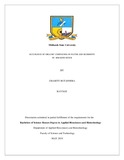Please use this identifier to cite or link to this item:
https://cris.library.msu.ac.zw//handle/11408/3728| Title: | Occurrence of organic compounds in water and sediments in Sebakwe river | Authors: | Rutanhira, Charity | Keywords: | Pollution Aquatic environment |
Issue Date: | 2019 | Publisher: | Midlands State University | Abstract: | Pollution of the aquatic environment is a major global concern as it is emerging that pollutants such as organic compounds are rising each day. The anthropogenic activities such as agricultural and wastewater effluent contribute to the pollution of aquatic resources. The aim of this study was to determine the spatial occurrence and concentration of organic compounds in water and sediment along Sebakwe River in Kwekwe. Water and sediment samples were collected once in January 2019 at six sites along Sebakwe River. The sampling points were selected to capture the different activities such as agriculture and sewage effluent discharge in the catchment with a potential to contribute organic pollutants in the aquatic environment. The water and sediment samples were analyzed for the presence of organic pollutants using a gas chromatography mass spectrometer at Central Veterinary Laboratory (CVL). The results showed that three different types of organic pollutants (pharmaceuticals, pesticide and food additives) were present in both the water and sediment samples. In addition, organic compounds naturally occurring in the environment were observed among all the sites. A total of 27 organic compounds were present in the sediment samples and 29 were present in the water samples. There was no significant difference in the concentration organic pollutants among the sites (p > 0.05). The occurrence of organic compounds such as pesticides were observed near areas with agricultural activities and pharmaceuticals were observed near the sewage effluent discharge point which suggests that the activities in the catchment have an influence on the type of organic compound found in the aquatic environment. The results from this study are important as they contribute to knowledge of the ecological health status of Sebakwe River. This information can be used by local environmental managers such as Environmental Management Agency (EMA) as baseline data for future monitoring studies and by Kwekwe City Council for the management activities in the catchment. Awareness programs are to be done so as to reduce organic compounds pollution of Sebakwe River and legislation on preserving natural resources is to be enforced in the catchment. | URI: | http://hdl.handle.net/11408/3728 |
| Appears in Collections: | Bachelor Of Science In Applied Biosciences And Biotechnology Honours Degree |
Files in This Item:
| File | Description | Size | Format | |
|---|---|---|---|---|
| Dissetation by Charity Rutanhira R153765Z.pdf | Full Text | 726.53 kB | Adobe PDF |  View/Open |
Page view(s)
278
checked on Feb 25, 2026
Download(s)
126
checked on Feb 25, 2026
Google ScholarTM
Check
Items in MSUIR are protected by copyright, with all rights reserved, unless otherwise indicated.



